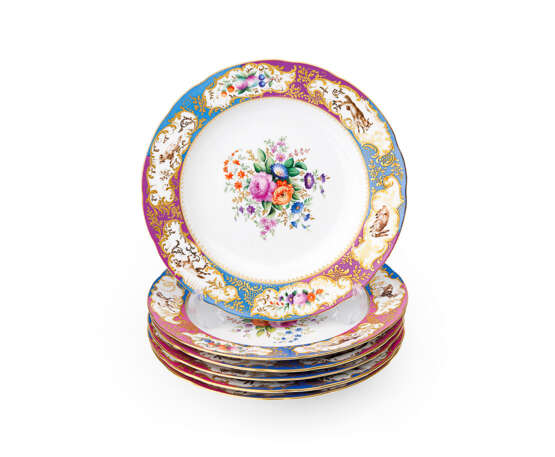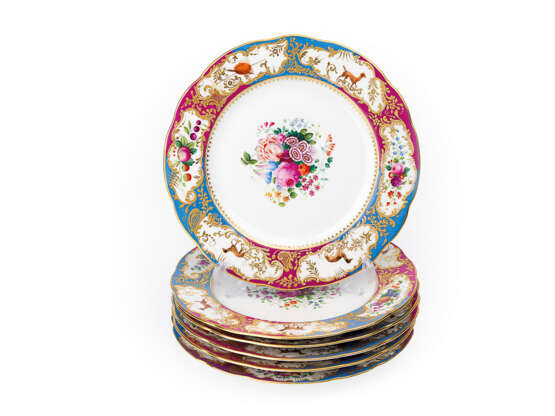ID 70947
Lot 336 | A Set of Six Dinner and Six Soup Plates from the Grand Duke Mikhail Pavlovich Service
IMPERIAL PORCELAIN MANUFACTORY, PERIOD OF NICHOLAS I (1825–1855)
Diameter of the dinner plate 25 cm, of the soup plate 24 cm.
Each of circular form, with scalloped rims, white centres painted with bouquets of flowers, varicoloured borders with reserves with animals, art trophies and flowers, with gilt rocaille ornament throughout, with blue Imperial cyphers for Nicholas I, impressed numbers; some further inscribed and numbered.
The offered service was gifted to the Grand Duke Mikhail Pavlovich by his royal brother, Nicholas I, and was used during His Imperial Majesty's receptions at one of his residences, the Mikhailovsky Palace in Saint Petersburg (now the State Russian Museum). The unique work of Russian applied and decorative art was created in the mid-1830s and decades later, the dinner service came to be part of the dowry of the Grand Duchess Yekaterina Mikhailovna, daughter of Mikhail Pavlovich. In 1851, she married Duke Georg August of Mecklenburg-Strelitz (1824- 1876), and in that same year the family purchased the estate Schloss Remplin, which became their official residence in Germany.
A recently discovered archive document showed that the dinner service was sent to Germany in August 1851. Correspondence of His Imperial Majesty's Chancery has revealed that, in the summer of 1851, the Imperial Porcelain Manufactory and Glass Factory were preparing to dispatch to Mecklenburg-Strelitz "...porcelain dinner services and cut-glass ware, made ten years earlier and maintained by the Ministry of the Imperial Court". The fragile consignment was sent overland, via Stieglitz & Co., to Königsberg, and then on to Berlin by rail. The Imperial Factories sent to accompany the waggon the factory craftsman N. Mikhailov, descended from a long line of factory employees, whose responsibility it was "to deliver the consignment to the most august addressee without the slightest damage".
In 1952, some of the dinner service was sold to Marjorie Merriweather Post, one of America's richest women and sole heir to the Postum Cereals company, for her residence in Washington, known today as the Hillwood Estate, Museum and Gardens. There is, however, speculation that individual items from the dinner service are still in the possession of the ducal family at their official residence, the Villa Silberburg in Hechingen.
The history of the Grand Duke Mikhail Pavlovich's dinner service offered here for auction merits particular attention, since it was tracked down only at end of the 20th century by Anne Odom, Russian art specialist and researcher at Hillwood Museum in Washington, DC. In her monograph Russian Porcelain at Hillwood (1999), she was the first to publish valuable information about its provenance.
The Grand Duke Mikhail Pavlovich's dinner service was made in the 1830s, the time when the Imperial Porcelain Manufactory was flourishing. The period from the 1830s is marked by a revival of interest in the national, Russian artistic legacy. One of the prominent trends within historicism was the "second rococo" (or "neo-rococo"), the style in which this dinner service had been decorated. Referring to art of the mid-18th century heralded a return to the origins of European porcelain, associated with the reign of Louis XV. Artists of the 19th century rightly supposed that art works produced then were lovely embodiments of the atmosphere prevalent during the time of Madame de Pompadour, which they were subsequently trying to resurrect in their own works. Thus, in the ornamentation of the Grand Duke Mikhail Pavlovich's dinner service, the rocaille decoration is particularly refined. In the 19th century, ornamentation was not merely a personification of beauty; it was also one of the most important factors in the development of aesthetic taste.
Due to the exclusivity of the items, the superlative artistic quality and variety of shapes and ornamentation, tableware sets of Nicholas's reign have come to symbolise the whole of the 19th-century Russian imperial porcelain. Among them, the dinner service of the Grand Duke Mikhail Pavlovich features quite prominently.
We are grateful to art historian Dr Ekaterina Khmelnitskaya for providing additional catalogue information.
| Address of auction |
MacDougall Arts Ltd. 63 New Cavendish St. W1G 7LP London United Kingdom | |
|---|---|---|
| Preview |
| |
| Phone | +44 20 7389 8160 | |
| Phone | +7 495 799 4683 | |
| Fax | +44 (0) 20 7389 8170 | |
| Conditions of purchase | Conditions of purchase | |
| Shipping |
Postal service Courier service pickup by yourself | |
| Payment methods |
Wire Transfer |



